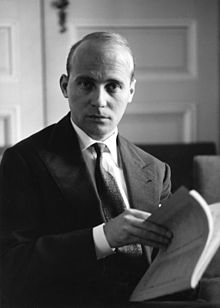Elegy for young lovers
| Elegy for Young Lovers Elegie für junge Liebende |
|
|---|---|
| Opera by Hans Werner Henze | |

The composer in 1960
|
|
| Librettist | |
| Premiere | 20 May 1961 Schlosstheater Schwetzingen |
Elegy for Young Lovers (in German, Elegie für junge Liebende) is an opera in three acts by Hans Werner Henze to an English libretto by W. H. Auden and Chester Kallman.
The opera was first performed in a German translation by Ludwig Prinz von Hessen at the Schlosstheater Schwetzingen at the Schwetzingen Festival on 20 May 1961, conducted by Heinrich Bender. The first performance using the original English text was in Glyndebourne, also in 1961. The Juilliard Opera Theater produced the opera in New York City in 1965, with the composer conducting. Henze revised the opera in 1987, and this revised version received its first performance on 28 October 1988 at the La Fenice Theatre, Venice, with Markus Stenz conducting.
According to Ann Saddlemyer in her book "Becoming George", the poet is partially based on W. B. Yeats, and his wife "George" (Georgie Hyde-Lees) was the inspiration for both the secretary and the woman with visions. David Anderson has noted that the poet also portrays Auden as well. Robert Henderson has summarised the thesis of the opera as follows:
Elegy for Young Lovers....is a bitter indictment of the Romantic notion of the artist as hero, feeding remorselessly on those around him both in the name of art and to satisfy his own monstrous and inhumanely egotistical appetites.
Auden and Kallman described this opera as their equivalent of Richard Strauss' opera Arabella. The dedication of the opera is to the memory of Hugo von Hofmannsthal.
Henze quoted material from the aria My own, my own in his Fifth Symphony, completed in 1962.
The opera is set in an inn called Der Schwarze Adler in the Austrian Alps in 1910. The plot is centred on a poet, Gregor Mittenhofer, who manipulates the people in the inn to provide inspiration to his work, his faithful secretary, his doctor, his young "muse" Elisabeth and a hysterical woman who lost her husband to the mountains decades before and has visions. When a young man arrives who attracts Elisabeth, Mittenhofer lets her go but doesn't act to prevent the young lovers' death in a snowstorm in the mountains, using the tragedy as the inspiration for a final "Elegie" of pure music, sung without words.
...
Wikipedia
